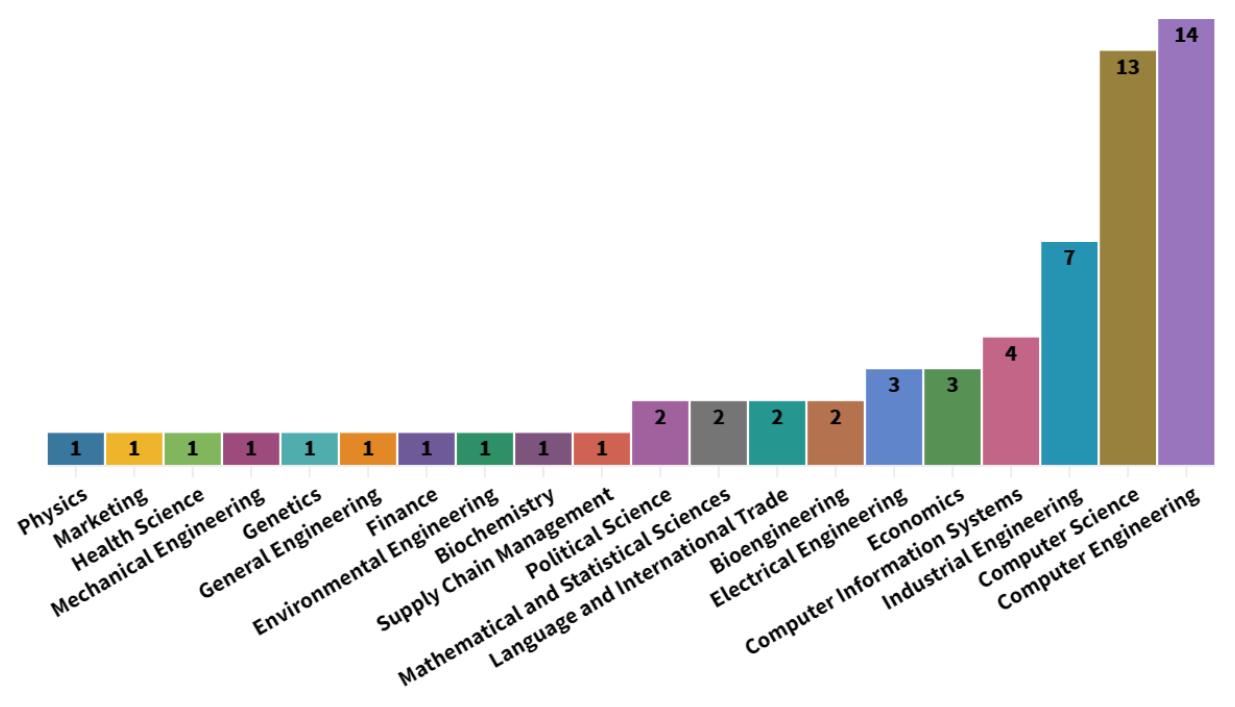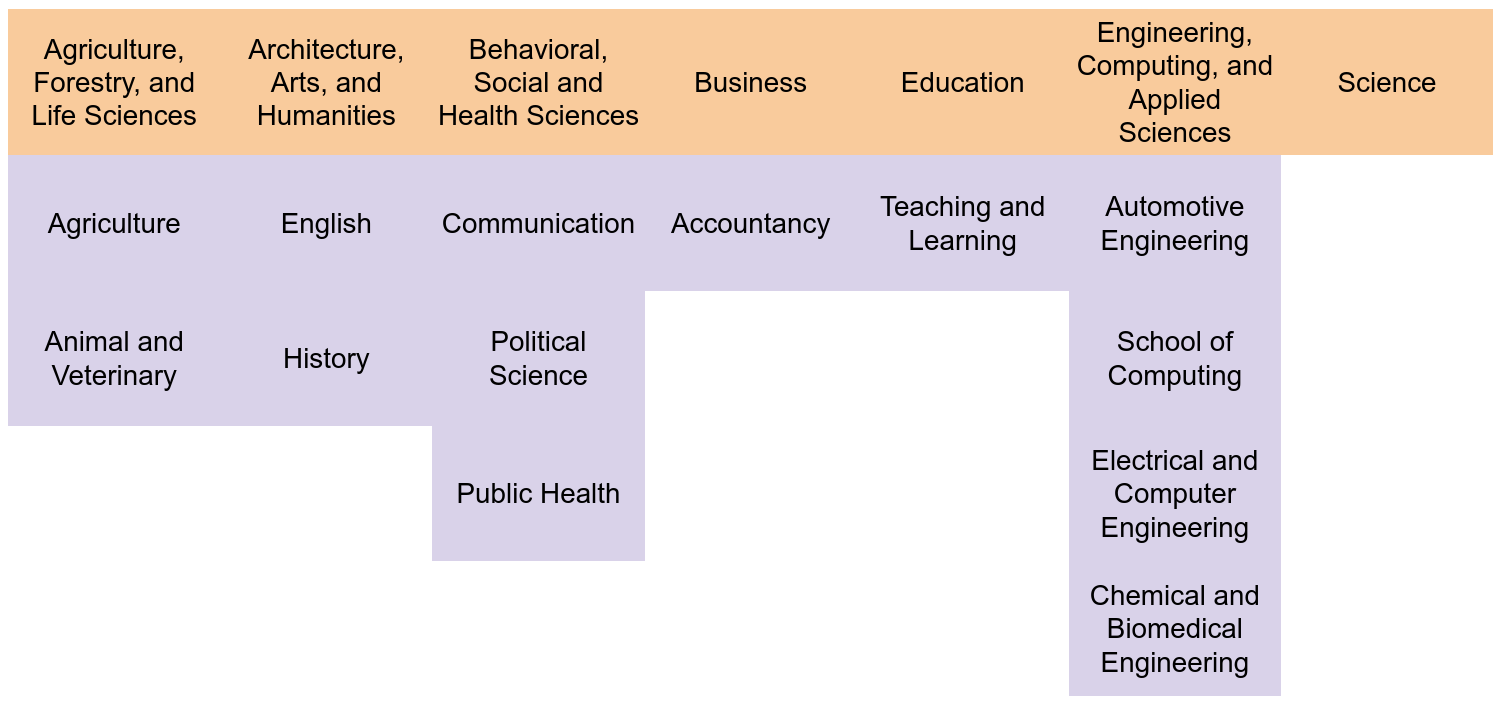
The Watt AI (WAI) program enables AI education and research applications within the broader Clemson Community. Since its beginning in late 2017, this program has worked intensively with dozens of students covering more than 20 academic majors to support research projects with faculty from as many academic departments. This work has led to multiple presentations at academic conferences, publication of peer-reviewed research, generation of novel datasets, follow-on grant funding opportunities, and one patent application.
Education
The Watt AI Creative Inquiry course is the core educational activity of the WAI program. This credited course focuses on applied AI methodology in the context of academic research.
Read more…
The course has two educational tracks with each track having 1 classroom contact hour per week:
-
First-time students: students taking the course for the first time work through an interdisciplinary program covering a broad range of topics relevant to Artificial Intelligence including IBM Watson, cloud computing, machine learning, statistical reasoning, application development, and societal considerations of AI. Material is presented as a mixture of lecture content, classroom discussions, and homework assignments. The goal of this introductory course is to equip students with the skills they need to succeed in applied AI research at Clemson and beyond.
-
Returning students: students taking the course for the 2nd or higher time participate in an “Advanced Topics” seminar course. Throughout the semester, all students present on topics of their choosing from the world of Artificial Intelligence. Presentations are followed by discussions facilitated by the WAI staff. The goal of this track is to broaden students’ exposures to diverse topics in AI and to deepen their mastery of specific topics that they present on. The returning student track is also designed to be “light weight” compared to the first-time student track leaving the returning students more time to focus on their research projects.
All students irrespective of track are placed on research projects as outlined in more detail below. In the context of these projects, the students receive more intensive, hands-on experience in specific areas as required by their projectss.
More than 60 undergraduates have participated in the WAI educational program. We are proud to recruit students from a wide range of academic disciplines. The following figure shows the distrubtion of student majors during the Spring 2020 term.

Research
The WAI program actively seeks out research collaborations with faculty and staff at Clemson University. In these collaborations, the WAI program seeks to enable effective applications of AI methodology to further the research goals of our partners.
Read more…
The enablement model roughly follows the following phases:
-
Identification: WAI consults closely with researchers to identify feasible, high-impact applications of AI. Often researchers have a pre-existing interest in AI but little knowledge of what is feasible or how to actually employ AI methods. WAI staff strive to understand the researcher’s objectives, identify whether or not an AI-based approach is appropriate, and shape the high-level goals of the researcher into clear, achievable objectives.
-
Strategy: Once a project is identified, WAI staff and students help form a strategic roadmap for achieving the stated research objectives. This phase involves a close examination of the project objectives and available data sources, and a weighing of possible methodology choices including modeling approaches and appropriate software. This strategy phase usually happens within the context of the student-researcher group meetings. Though this level of decision making is a stretch for most students, we believe their involvement is a novel educational opportunity not afforded by a classroom setting.
-
Implementation: Once a strategy has been formulated, tasks are divided among the students, researchers, and WAI staff. WAI staff advise the students closely to make sure they understand their role and have a clear path forward. In this context, the students receive focused training on specific AI methods. Implementation activities often include data collection, application of Machine Learning models, data visualization, and statistical analysis.
-
Delivery: Once a project begins to meet its research objectives, activities will often shift toward producing tangible outputs such as conference presentations, publications, grant proposals, patent applications, demonstrations of technology development, and pilot deployments. Students take an active role in this process, whether it be helping to write academic papers, presenting at conferences, or coordinating with the university or outside institutions to demonstrate the technology we’ve developed.
The WAI program has facilitated more than 20 machine-learning and AI-related research projects at Clemson. We are proud to have collaborations with a wide variety of researchers in more than 20 departments or institutions. The table below shows the Clemson academic departments we have worked with so far.

Leadership
The WAI program is organized by Clemson’s Watt Family Innovation Center.
Read more…
Executive Leadership
Dr. Todd Marek, Watt Center Executive Director, Dr. Kuang-Ching Wang, Watt Center Associate Director for Research, Dr. Barbara Speziale, Watt Center Associate Director for Academic Affairs and Director of Creative Inquiry, and Dr. Mark Krystofik, Watt Center Associate Director for Operations and Sustainability, have been integral to the vision, creation, and strategic leadership for the Watt AI program. The Executive Leadership team has been engaged in development of the Watt AI project portfolio and integration of Watt AI to broader initiatives across the university.
Watt AI Staff
 Dr. Hudson Smith joined the Watt AI program in March 2018. Received his Bachelor’s degrees in Physics and Mathematics from Erskine College in Due West, SC and a Ph.D. in Physics from The Ohio State University where he studied theoretical quantum mechanics with an emphasis on scientific computing. Following his graduate work, Hudson entered the data science industry, applying statistics and machine learning techniques to solve problems within the healthcare domain. Hudson’s primary research interests are in the areas of Natural Language Processing and Representation Learning through his work in the WAI program has him involved in everything ML and AI!
Dr. Hudson Smith joined the Watt AI program in March 2018. Received his Bachelor’s degrees in Physics and Mathematics from Erskine College in Due West, SC and a Ph.D. in Physics from The Ohio State University where he studied theoretical quantum mechanics with an emphasis on scientific computing. Following his graduate work, Hudson entered the data science industry, applying statistics and machine learning techniques to solve problems within the healthcare domain. Hudson’s primary research interests are in the areas of Natural Language Processing and Representation Learning through his work in the WAI program has him involved in everything ML and AI!
 Dr. Carl Ehrett is a research associate in the Watt AI program in the Watt Family Innovation Center. He facilitates research activities applying artificial intelligence and machine learning techniques, and works with students and faculty to foster interdisciplinary collaboration growing the AI and analytics community within Clemson. Carl received an M.A. in philosophy from the University of Kentucky with emphasis on cognitive science. He then earned a Ph.D. in analytic philosophy from Northwestern University, researching semantic modeling of vagueness in natural language. Carl went on to earn an M.S. and Ph.D. from Clemson’s School of Mathematical and Statistical Sciences, focusing on computational mathematics and statistics, Bayesian statistics, and computer model calibration.
Dr. Carl Ehrett is a research associate in the Watt AI program in the Watt Family Innovation Center. He facilitates research activities applying artificial intelligence and machine learning techniques, and works with students and faculty to foster interdisciplinary collaboration growing the AI and analytics community within Clemson. Carl received an M.A. in philosophy from the University of Kentucky with emphasis on cognitive science. He then earned a Ph.D. in analytic philosophy from Northwestern University, researching semantic modeling of vagueness in natural language. Carl went on to earn an M.S. and Ph.D. from Clemson’s School of Mathematical and Statistical Sciences, focusing on computational mathematics and statistics, Bayesian statistics, and computer model calibration.